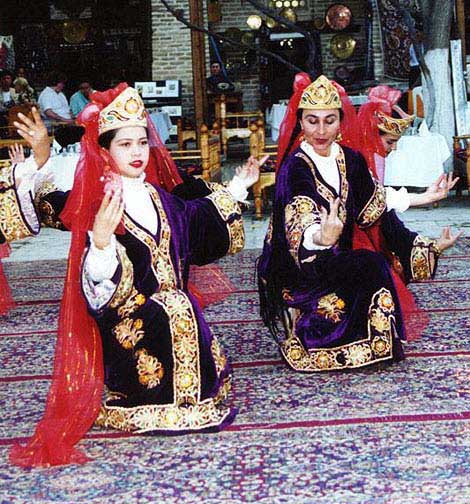
Liz Rodgers says that the traditions surrounding the role of women in Uzbek society differ from American expectations of women
Alum travels to Uzbekistan with the Peace Corps
Liz Rodgers merges the urge to travel with the urge to "give back"<
By Patrice Taddonio
Daily Editorial Board
Uzbekistan, a predominantly Muslim Central Asian country the size of California, is a long way from suburban Detroit. But for Tufts graduate Liz Rodgers (LA '00), living in the outskirts of the motor city helped her to develop the cultural curiosity that would one day lead her to Uzbekistan with the U.S. Peace Corps.
"At my high school, there were kids of many different ethnicities and cultural backgrounds -- Arab Americans, African Americans, Chinese Americans, Mexican Americans, people of Christian, Jewish or Muslim faiths," said Rodgers, who majored in philosophy and minored in English at Tufts in addition to playing the flute in the University symphony orchestra and band.
Interacting with individuals from different cultures may have always been a part of her life, but it wasn't until the spring semester her junior year that Rodgers says her "wanderlust was ignited."
"My semester in Seville, Spain, was my first trip to a non-English-speaking country, and opened my eyes to what it was like to live as foreigner within a different culture," Rodgers said. "I discovered that I love learning to express myself in another language and learning to live in a different culture."
When she returned to Tufts her senior year, Rodgers "dreamed of living overseas again after graduation," but also "felt [she] needed to do something focused outside of [herself]." That's where the Peace Corps came into play.
"I started thinking about joining the Peace Corps during my senior year," Rodgers said. "After four intense, expensive years of college, I wanted to give some of all that had been invested in my personal development back to the world. The idea of spending two years dedicating myself to service in a developing country was exactly what I needed at that point in my life."
For Rodgers, who is interested in biology and health sciences in addition to English and philosophy, this career path was one in a long line of ambitions. "I went through periods where I wanted to be a biologist, finding cures for diseases, and other periods where I wanted to be a famous novelist or a college professor," she said.
As a health extension volunteer in Uzbekistan with the Peace Corps, Rodgers had the chance to work within the health science realm. She lived in a small rural town and worked with a gynecologist at a local hospital to create educational programs for pregnant women on topics including proper nutrition, anemia prevention, breastfeeding and baby care.
"I also went to kindergartens in my town to do interactive health lessons for kids that included games, songs and puppet shows, and I started a youth group in my town for 14-to 16-year-olds and led sessions for them that focused on developing decision-making skills, goal-setting, and reproductive health," said Rodgers, who edited and translated sections of an American adolescent health manual into Uzbek for the sessions.
"I also collaborated with another Peace Corps volunteer on a doctor re-training project," Rodgers said. "We wrote a grant proposal to get funding for six doctors from our communities to be trained for a week by the American doctor in the capital city. The doctors then returned to their hospitals and lead seminars for other medical workers to teach them what they had learned about topics like proper sanitation, HIV prevention, and appropriate drug prescriptions."
Rodgers also had work of another sort to do upon her arrival in Uzbekistan: adapting and adjusting to Uzbek culture and traditions (see box). The best way to do so, Rodgers said, "was to observe others before acting, find a local ally I could ask questions about cultural appropriateness of, and to always err on the side of caution and conservativeness."
Rodgers had been in Uzbekistan for nine months when the Sept. 11 attacks took place. On Sept. 22, at the dictate of the Peace Corps, she returned to the United States.
"My work as a Peace Corps Volunteer was just getting off the ground, and I was beginning to feel the start of deeply special friendships with my host sister and others in my community," Rodgers said. "The thought that I wouldn't get to see where the two years would take me -- what work I could accomplish and the friendships that would develop -- was heartbreaking."
Determined to finish what she had started, Rodgers returned to Uzbekistan in 2002 and noticed a shift in the Uzbeks' attitude towards Americans.
"Instead of just commenting on the riches of America they'd seen on TV, when I met a local person for the first time they often asked me if my friends and family were safe after the attacks in America," Rodgers said. "Since people in Uzbekistan tended to have an idealized view of Americans as rich people with everything they could want at their fingertips, hearing about our national tragedy may have made us more three-dimensional to some."
Rodgers' experience in Uzbekistan also made the country's inhabitants more three-dimensional to her. "I often look back with wonder at the aspects of Uzbek culture that made me feel at home in such a far-away and foreign place," Rodgers said. "I miss the sense of community I always had in my small town, stopping by neighbors' houses at any time and being asked to stay for tea and chat, and regularly going to social events like traditional Uzbek weddings, eating and dancing along with neighbors of all ages."
In the last several months since of her time in Uzbekistan, Rodgers passed her appreciation for Uzbek culture on to the Peace Corps volunteers that followed her.
"In the final three months of my service, I had the opportunity to act as a training assistant for the newest group of health volunteers," Rodgers said. "It was very gratifying to end my Peace Corps service that way -- passing on the knowledge and skills I had gained in two years' time to the next generation of volunteers."
Rodgers said her experience in Uzbekistan "gave [her] the genuine self-confidence that [she] can do absolutely anything."
"As a Peace Corps volunteer, I learned a lot about the public health field, education and working with non-profits," she added. "The future is wide open to me as I decide which path is the right one."
Though she's been back in the United States for more than a year, Rodgers is still "coming to terms with the differences between my American lifestyle and the life of my friends in Uzbekistan."
"As I catch myself getting caught up in the fast pace of success-driven American culture, I try to make sure to take a deep breath and remember the feeling that surrounded me in my Uzbek community -- the feeling of a slower way of life, where people value hard work but appreciate family and community above all else," Rodgers said.





